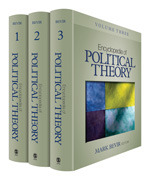Encyclopedia of Political Theory
no information available
In discussing a topic, political science lecturers and course textbooks often toss out the name of a theorist or make a sideways reference ta particular theory and move on, as if assuming their student audience possesses the necessary background tappreciate and integrate the reference However, academic librarians can tell you this is usually far from the case Students often approach them seeking a source tprovide a quick overview of a particular theory or theorist with just the basics: the who, what, where, how, and why And librarians often find it difficult tguide these students ta quick, one-stop source SAGE Reference presents the three-volume Encyclopedia of Political Theory, available in both print and electronic formats This work serves as a reference source for anyone interested in the roots of contemporary political theory Drawing together a team of international scholars, it examines the global landscape of all the key theories and the theorists behind them, presenting them in the context needed tunderstand their strengths and weaknesses In addition tinterpretations of long-established theories, it alsoffers essays on cutting-edge research as one might find in a handbook And, like an unabridged dictionary, it provides concise, to-the-point definitions of key concepts, ideas, schools, and figures Coverage includes: -Ancient Theory -Medieval Theory -Early Modern Theory -Enlightenment -Modern Theory -Constitutionalism -Liberalism -Critical Theory -Continental Theory -Empirical Theory -Comparative Political Thought ... Read more Read less











